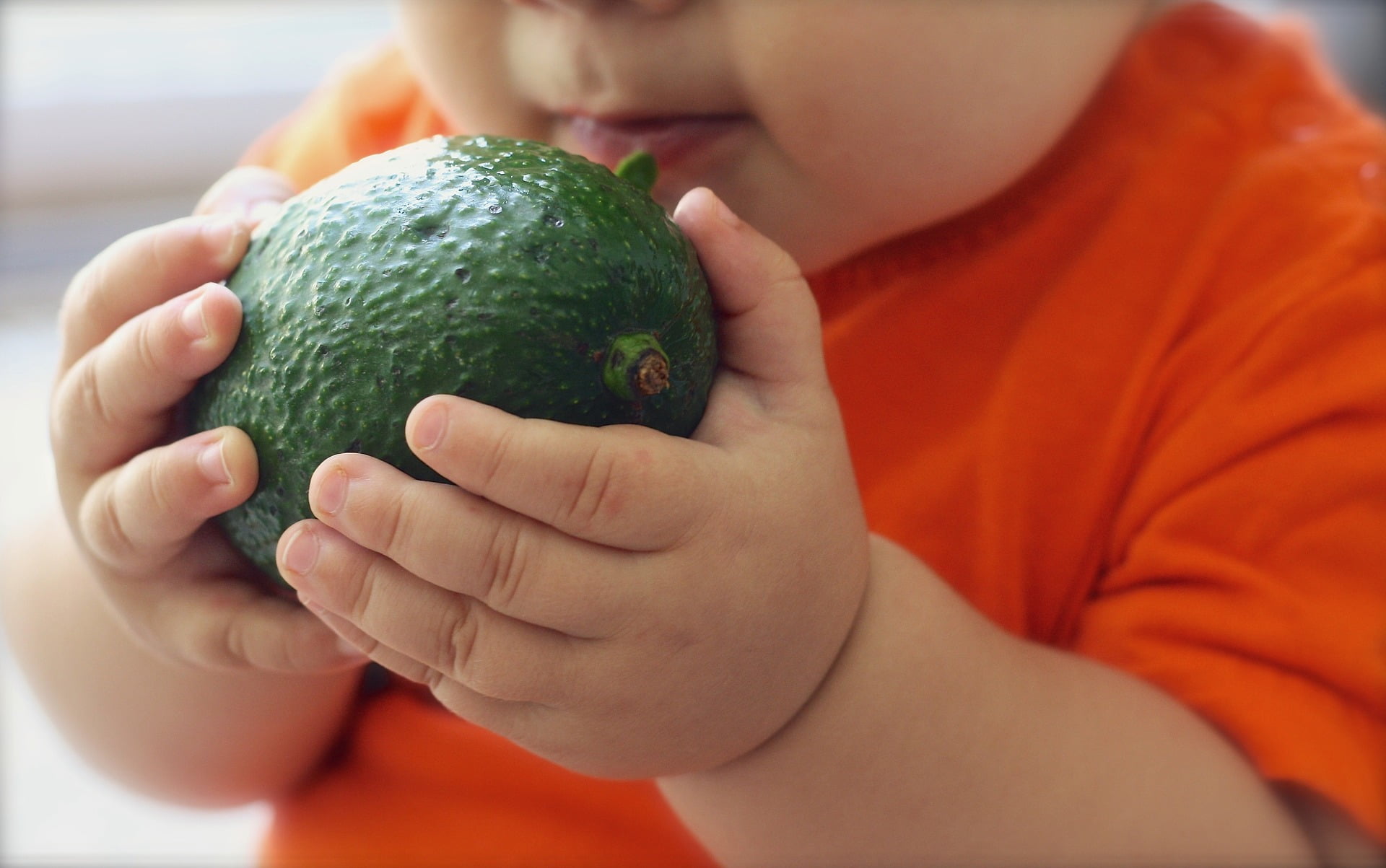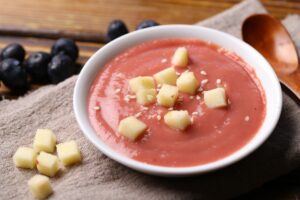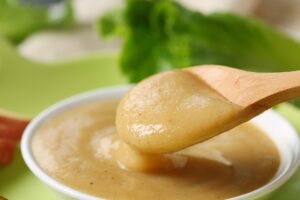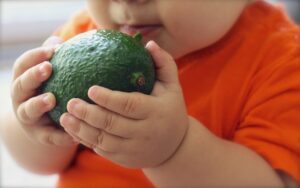What’s The Best Age To Start Solid Food For Babies?
- Published on:
- Last update: 09 October 2023

Solid Food For Babies
Solid food for babies is an important step in a baby’s development. Learn when and how to introduce solid foods when a child is weaned off breast milk or formula.
When your baby tastes solid food for the first time, it is a major milestone. Before you give your baby the first bite, here are a few things that you should know.

Is Your Baby Ready To Eat Solid Foods?
The only food your newborn needs is breast milk or formula. Breastfeeding should be exclusively continued for the first six months after birth.
By the end of the 4th or 6th month of a baby’s life, most of them are ready to start eating solid foods in addition to breastfeeding or formula-feeding. As a baby grows, they typically stop using their tongues to push food out of their mouths.
In order to swallow solid food, they develop the coordination of moving solid food from the front of their mouth to the back. Make sure your child is ready to start solid food for babies.
Check for other signs that your baby is ready for solid food in addition to age. Here are some examples:
- What is your baby’s head position when he or she is upright and steady?
- Does your baby have the ability to sit with support?
- Does your baby mouth his or her hands or toys?
- When your baby leans forward or opens his or her mouth, does this indicate a desire for food?
You can begin supplementing your baby’s liquid diet if you answer yes to these questions and your baby’s health care provider agrees.
When And What To Serve
Continue to feed your baby up to 32 ounces of breast milk or formula every day. Next, you will:
Start Simple.
Offer sugar- and salt-free foods made with only one ingredient. It is recommended that you wait three to five days between introducing a new food so you can observe if your baby has a reaction, such as diarrhea, a rash, or vomiting.
Combining the single-ingredient and combined foods is the next step after you introduce the single-ingredient foods. Solid food for babies should be simple and easy to digest.
Important Nutrients
The second half of your baby’s first year is an important time to ensure your baby is getting enough iron and zinc. The nutrients found in pureed meat and iron-fortified single-grain cereal can help you maintain a healthy cardiovascular system. Make sure the solid food for babies is nutrient-rich and healthy.

Baby Cereal Basics
An ideal combination is one tablespoon of iron-fortified single-grain baby cereal with four tablespoons of breast milk or formula. If you feed it in a bottle, the baby will not get enough iron. If necessary, help your baby sit upright and give him or her cereal with a small spoon twice a day after he or she has a bottle.
Start By Serving One Or Two Teaspoons.
Your baby can then slowly increase the serving size and liquid content of the cereal after getting the hang of swallowing the runny cereal. A variety of single-grain cereals are available, for example, rice, oatmeal, or barley. You should not feed your baby only rice cereal as this could cause exposure to arsenic.
Include Fruits And Vegetables.
Progressively introduce single-ingredient pureed vegetables and fruits without any sugar or salt. Each new food should be introduced three to five days apart. Include softened fruits and vegetables as solid food for babies.
Serve Finely Chopped Finger Foods.
The majority of babies are able to eat small amounts of finely chopped finger foods, including soft fruits, vegetables, pasta, cheese, well-cooked meat, crackers, and cereal, by the eighth to the tenth month of their lives.
What If My Baby Refuses Their First Feeding?
When babies first consume pureed foods, they usually reject them because the taste and texture are unfamiliar. Avoid forcing the feeding if your baby refuses it. Give it another week. Consult your baby’s health care provider if the problem persists to ensure the resistance isn’t indicative of something more serious.
Is There A Problem With Food Allergies?
It is recommended that you introduce potentially allergenic foods to your baby when you introduce other complementary foods. The following foods are potentially allergenic:
- Peanuts and tree nuts
- Egg
- Cow milk products
- Wheat
- Crustacean shellfish
- Fish
- Soy
Applied to food allergies, delaying the introduction of these foods does not appear to prevent them. Early introduction of peanut-containing foods might reduce your baby’s risk of developing a peanut allergy.
If your child has a food allergy, you should take an oral antihistamine with you the first time your child eats a highly allergenic food – and not at a restaurant. Once there is no reaction to the introduction of food, increasing quantities can be introduced.
Is Juice Alright?
Juice should not be given to babies before they are 1 year old. Adding juice to a baby’s diet isn’t necessary, and it isn’t as healthy as eating whole fruit. A lot of juice can make a baby gain weight and cause diarrhea. Regularly drinking juice can lead to tooth decay.
Make sure you give your baby only 4 ounces of juice a day and choose 100% fruit juice.

Knowing What You Can And Cannot Do
There are some foods that babies should not eat. Keep these guidelines in mind:
Before age 1, do not give cow’s milk or honey. An infant’s nutritional needs are not met by cow’s milk – it is not a good source of iron – and can increase the risk of iron deficiency. There is a possibility that honey contains spores that can cause a serious illness called infant botulism.
Foods that can cause choking should not be given to your baby. Avoid offering your baby hot dogs, chunks of raw meat or cheese, grapes, raw vegetables and fruit chunks unless they have been cut up into pieces when he is ready to eat solid foods.
Moreover, don’t offer hard food products like nuts, seeds, popcorn, and hard candy that can’t be altered to make them safe. You should also refrain from offering peanut butter and marshmallows. If you want to introduce nuts to young children and prevent choking, spread peanut butter thinly over the fruits or blend peanut butter and peanuts with fruits or vegetables.
Preparing Baby Food At Home
You should avoid giving your baby solid foods before age 4 months due to the risks associated with certain home-prepared foods. Babies under four months of age shouldn’t be given home-prepared spinach, beets, carrots, green beans, or squash. It is possible that these foods contain enough nitrates to cause methemoglobinemia.
Make Meals Manageable
While your baby is feeding, talk to him or her and provide him or her with guidance. Here are some tips for making mealtime enjoyable:
Stay Seated
Your baby should use a high chair with a wide, stable base as soon as he or she can sit without support. Be sure to buckle the safety straps.
Encourage Exploration
You can expect your baby to play with his or her food. Foods for finger foods should be soft, easy to swallow, and easily broken down into small pieces.
Introducing Utensils
You can give your baby a spoon to hold while you feed him or her with another spoon. You can teach your baby to use a spoon once his dexterity improves.
Offer A Cup
You may be able to wean your baby from a bottle by feeding them breast milk or formula from a cup at mealtimes. Your baby might be able to drink from a cup on its own when they are 9 months old.
Dish Individual Servings
You should not feed your baby directly from a jar or container as saliva on the spoon quickly spoils food. Put servings on a plate instead. Jars of baby food that have been opened can be stored in the refrigerator for two to three days.
Avoid Power Struggles
Avoid introducing new foods if your baby turns them away. Reintroduce them at a later date. That way your baby will be exposed to a wider variety of foods.
Know When To Call It Quits
It is common for your baby to cry or turn away once he or she has eaten enough. Avoid forcing your baby to eat more. It is likely that your baby is getting enough food as long as its growth is on track. You should also not try to get your baby to eat a lot of food at bedtime so he or she will sleep through the night. Research has not revealed whether this is effective.
Enjoy The Baby Feeding Time
You can enjoy your baby’s sloppy tray, gooey fingers, and sticky face. Those messy little meals build the foundation for a lifetime of healthy eating. Try to enjoy the feeding time with your babies. Feeding time creates wonderful relationships between parents and their babies. Every parent worries about how, when, and what to feed their baby – but there’s good news: Babies are pretty good at judging when they’re hungry and when they’re full, and they’ll let you know when they’re hungry and full.
Providing them with the right choices at the right time and paying attention to their cues is all that’s required. If you have any questions or concerns about solid food for babies, consult a pediatrician to help you along the way.
Share this post:

